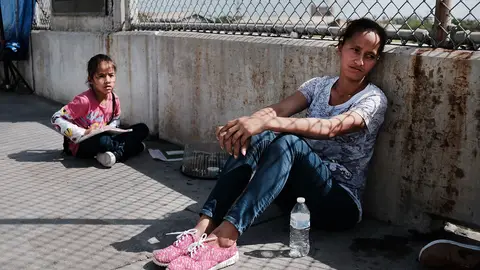What It's Like To Spend A Month In An Immigration Detention Center

In 2016, Ana Baires fled El Salvador with her 4-year-old daughter. They crossed into the U.S. from Mexico seeking asylum with four other mothers and their young kids — as well as some unaccompanied children. Shortly after, they were all stopped by border agents and eventually taken to detention centers. All told, Ana and her daughter spent nearly a month detained; because this happened before the Trump administration's policy of separating families at the border split up over 2,000 migrant children from their parents, she remained with her daughter the entire time.
Their stay was marked by Ana's daughter's health problems, including asthma and a fever, as well as the rigors of the facility: electrified fences, stark trailers, a general sense of uncertainty. "They try to make it not seem like a prison," Ana told MTV News, via an interpreter, "but it is a prison after all." Below, 39-year-old Ana tells her story about what happened when she came to the U.S. and what's happened since. [This conversation has been edited and condensed for clarity.]
We crossed the river at 4 in the morning. After that, we walked for an hour. We had to cross three metal fences, and then we got to a road where we were found by border patrol. We were detained. The officers were asking us for our papers and where we were coming from, and then we were taken to [the first facility], which is kind of like the freezer or the icebox. We were put inside a big room. They took our sweaters. They took our belongings.
Unfortunately, [my daughter] had a fever. I was trying to tell the officers that my daughter was feeling really sick. She was just getting worse and worse, so I got close to a window and I told the officer that was outside, "Can you please help me? My daughter is really getting very sick." But the officers said, "There's nothing I can do right now. You should've thought about this before coming. And you might as well have died on the way here."
[The detention center] is a big, big lot where clearly no one can leave. They have electric fences around the area and they have trailers, which are the rooms where they had the families. Each trailer had six bunk beds for each mom with her kids.
We also had set times for breakfast, lunch, and dinner that were between one hour and an hour and a half, and that was the only time we could eat. If the kids couldn't make it at that time or were sleeping or they weren't hungry at that time, they just had to wait until the next meal. Some little kids would go to bed hungry because they couldn't eat at dinner time. At night, it was really hard because they would turn down the lights at 8 p.m. There was nothing else to do. We had to go to bed at that time.
After we were released, we were sent to the second place of detention, which is kind of "the dog pound," where they have cages. We were able to see a doctor then. But they only gave [my daughter] Tylenol. And then when we went a couple days later to the detention center, they took the medicine away and they told us that she was going to see another doctor then, who would give her something else.
[Later] when they told us that we were gonna be released from detention, after we passed our credible care interview, I was very happy. I thought that we were going be able to be free, and I had someone who — the person that had helped us to come to the country was going to welcome us to their home in North Carolina. But it was really hard. Even taking that step was really hard because we didn't have any money or any food. We just had enough to get on a bus to North Carolina, and it was a very long ride.
We didn't have any medicine for my daughter aside from the spray that they had given her, so she was still feeling very bad from her asthma, and I had an ankle bracelet. [Editor's note: Immigration and Customs Enforcement (ICE) often uses GPS monitoring for people who have been detained and subsequently released. An estimated 30,000 people were under electronic supervision in 2016.]
When we got to that home [in North Carolina], we had to stay there because of the ankle bracelet. The family of the man that had helped us, they didn't like us. They would treat us bad, sometimes let us go without giving us food. And it was a really hard situation, until my ankle bracelet was removed and we were finally able to move out of that house.
[Trump's policy of separating families] is one of the most cruel policies that I've ever seen because the children that are coming here with their families, aside from the already traumatic experience of coming here, separating them from their parents is even worse because for many of the children, that's the only thing that they have — their mom or their dad. They don't have anything else. Some children would actually think that their parents abandoned them when they don't see them, when they don't have them close.
In the same way, for example, in my case, I am very afraid of going back to El Salvador. There were threats against my family members, and they're just waiting for me to go back to kill me. Many people are like me, in that same situation — coming here because they are afraid for their lives. I want people to know my story, that people like me come here looking for an opportunity and not to take anything away from anyone, or to take anything by force.





